Punjabi Sikh Truckers Lack Access To COVID-19 Information
5:58 minutes
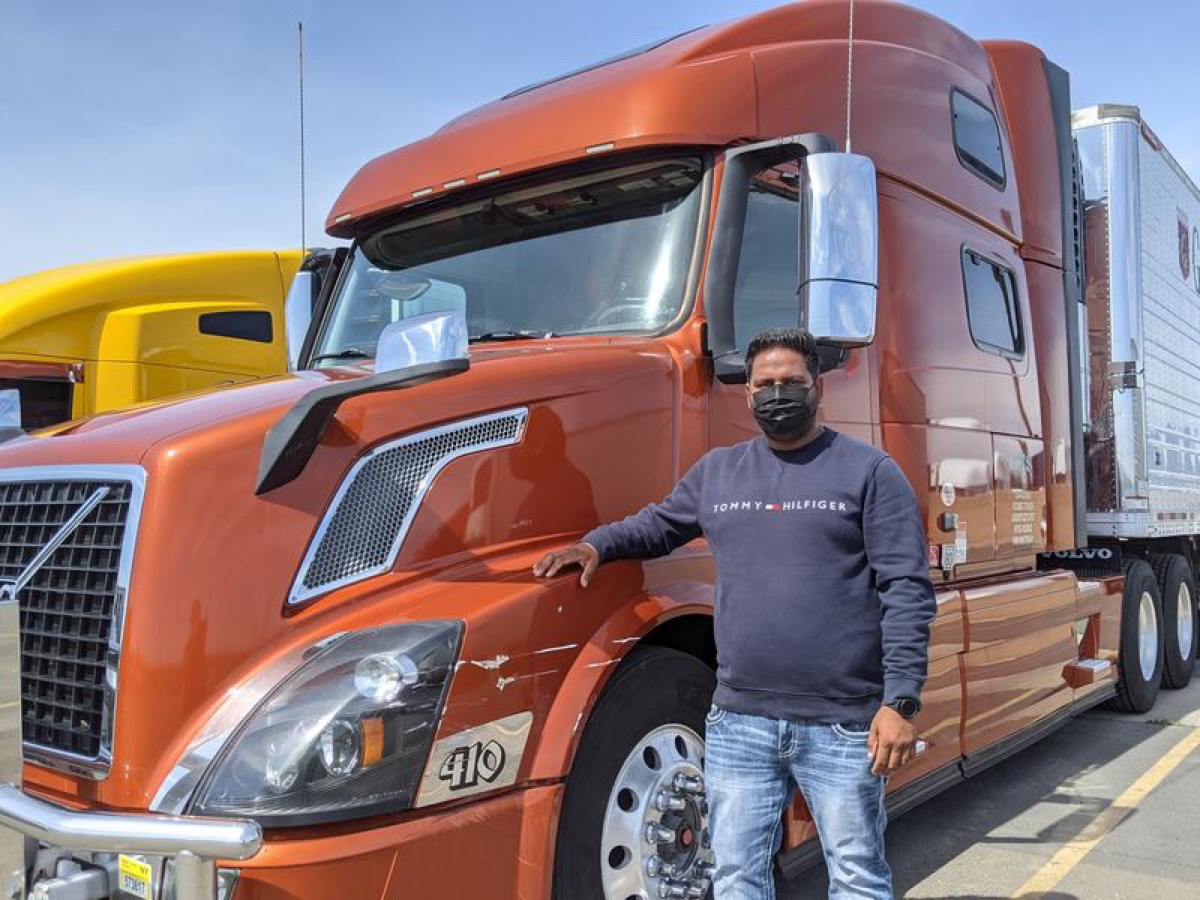
 This segment is part of The State of Science, a series featuring science stories from public radio stations across the United States. A version of this story, by Kerry Klein, originally appeared on Valley Public Radio in Fresno, California.
This segment is part of The State of Science, a series featuring science stories from public radio stations across the United States. A version of this story, by Kerry Klein, originally appeared on Valley Public Radio in Fresno, California.
The cab of Sunny Grewal’s 18-wheeler is neat and tidy. He’s got bunk beds with red checkered sheets and gray interior cabinets that hide a fridge, microwave, paper plates and spices for long days on the road. One plastic container holds bite-sized sweets from his native India. “We call it gur, G-U-R,” Grewal says. “You can put it in tea, or you can have a small piece after food.”
Grewal is a trucking company owner-operator based in Fresno. He’s on the road upwards of 150,000 miles a year, delivering produce and cleaning supplies like hand sanitizer to and from the East Coast, the Midwest, and the South. In other words, his work is essential to keeping this country running. “If nurses want to take care of you, they need the stuff that we bring,” he says. “You want to buy food to stay home, you’re going to stock the food in your house, we bring that food.”
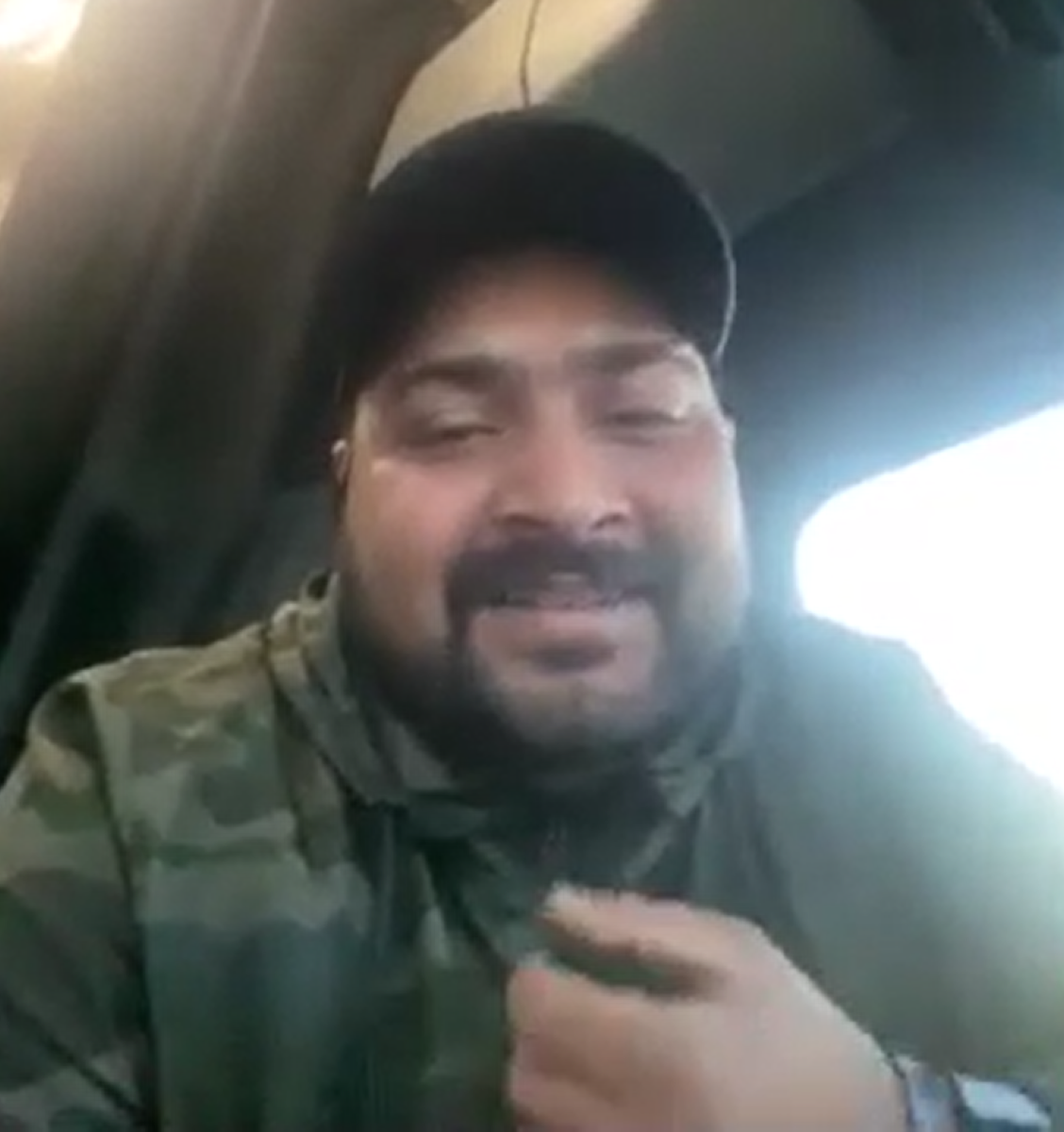
Early on in the COVID-19 pandemic, the state of California designated truckers as essential workers, but that status hasn’t materialized into any tangible advantages or privileges:No requirements that rest stops remain open, no hazard pay, and no priority access to the vaccine. “It is strange that our day didn’t come sooner,” says Lovepreet Singh, a truck driver from Bakersfield who was hoping momentum in support of his industry would build after the White House honored truck drivers with a rally in April 2020.
Singh and Grewal are also among an estimated hundreds of thousands of truckers in the U.S. who are Sikh, from the northern Indian state of Punjab. The North American Punjabi Trucking Association estimates Punjabi Sikhs make up 20 percent of the country’s truckers and control as much as 40 percent of the industry in California, and yet few public health departments in the state offer critical COVID-related information in the Punjabi language. “It makes me feel left over, you know?” says Grewal.
That lack of information has had consequences for the whole Punjabi-speaking community, says Manpreet Kaur of the non-profit Jakara Movement, especially in the early days of the pandemic. “The information was just always missing or it was too late or it was shared in a way that wasn’t easily understood,” she says.
Kaur recalls a day last year she was standing outside a Sikh temple known as a Gurdwara in Bakersfield, when a woman standing near her asked her to stop practicing social distancing and move forward in line. “She was like ‘no, that’s not how the virus is passed, it’s through surfaces,’ and I’m like that is at least six-month-old information,” Kaur says.
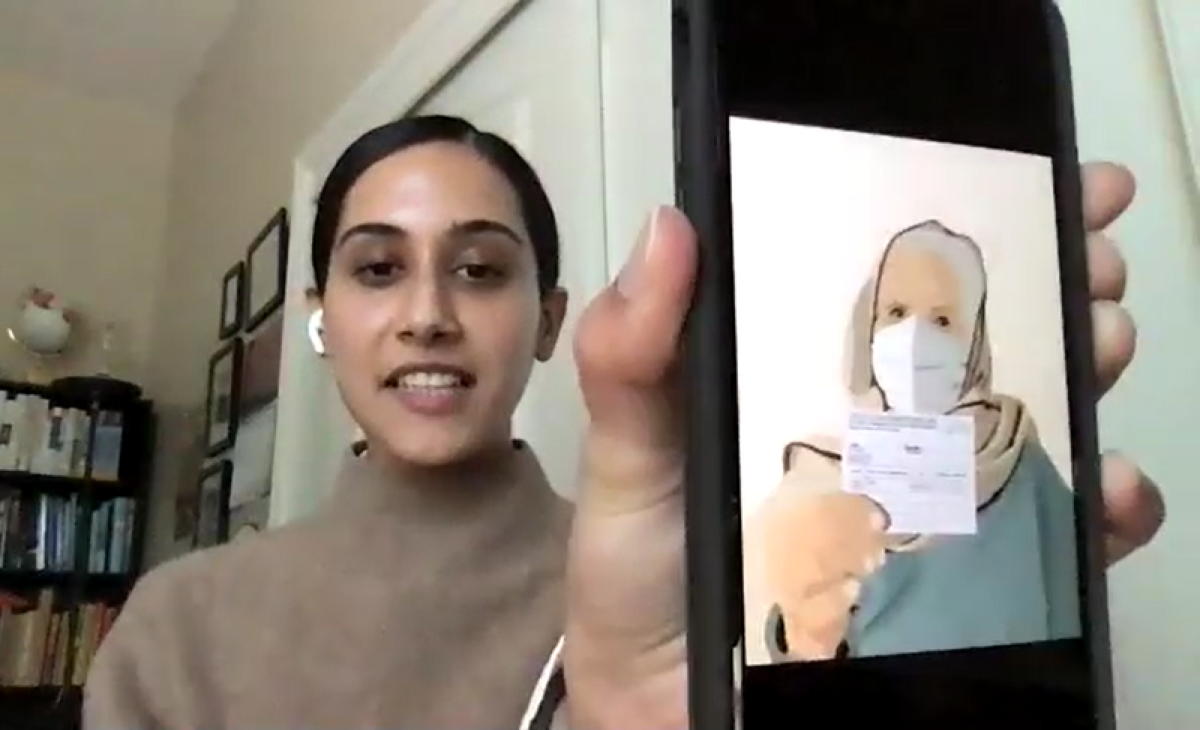
It’s difficult to quantify the stakes of the pandemic for California’s Punjabi Sikh population, but many cities with large diaspora, like Livingston and Yuba City, have case rates that far exceed their county averages. The Jakara Movement estimates that at least four Punjabi Sikh workers were among the 14 who died in COVID outbreaks at Foster Farms poultry processing plants in Merced and Fresno Counties. “Punjabis tend to be in food processing, trucking, all of the essential work that has high exposure,” Kaur says.
So, early on, the Jakara Movement, an organization that fosters leadership and community-building among Punjabi Sikhs and other underserved communities, began translating important health information into Punjabi. They created culturally sensitive visuals, like a graphic of a Punjabi grandmother getting her COVID vaccine, and a video about vaccinations featuring Punjabi Sikh doctors.
Jaspreet Singha, another truck owner-operator based in Fresno, says there’s an intimacy in receiving information in his native tongue, even though he’s proficient in English. “It makes you feel more recognized, makes you feel, yes, your hard work is paying off when your country needed you,” he says.
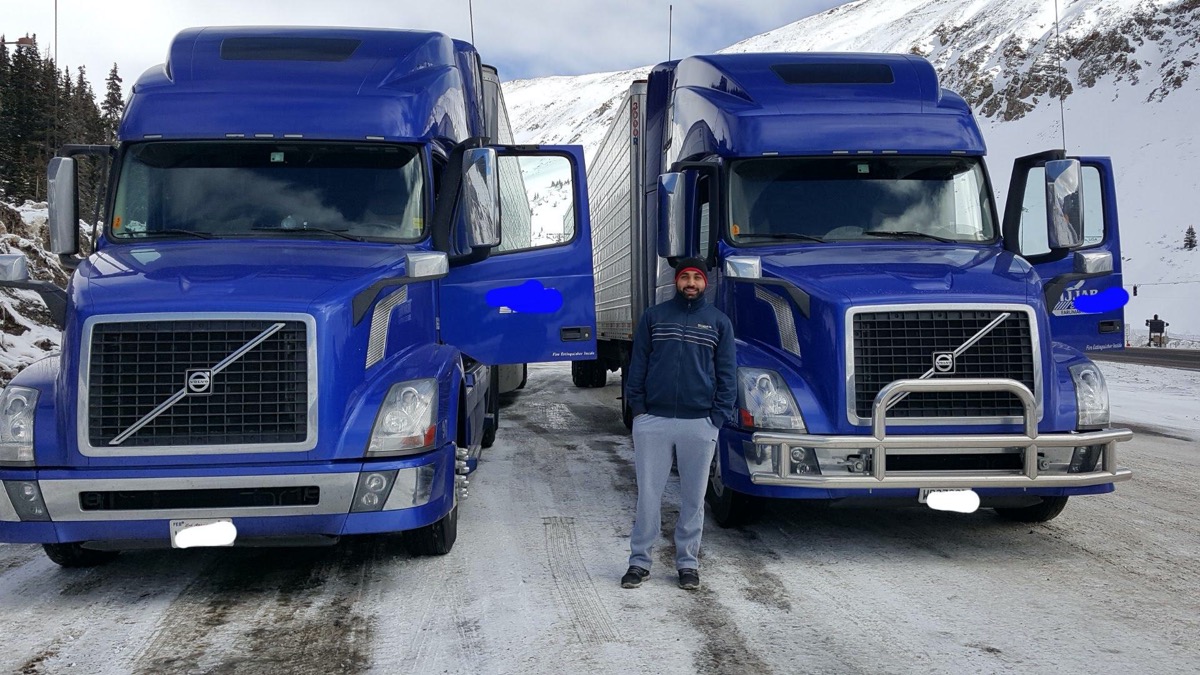
That’s why Rajkaranbir Singh also stepped in to fill Punjabi-language COVID information gaps. He’s a Fresno-based announcer and engineer with Punjabi Radio USA, a radio station offering 24 hours of music, religious programs and information, which doubled its news programming in the last year as more and more callers reached out to the station with COVID-related questions. “We took that challenge and made it our responsibility that ok, we have to make this our priority to give information as much as possible to our community,” he says.
Call-in shows are now almost singularly focused on COVID, he says, and have evolved from providing information about basic health precautions to the specifics of PPP loans. “Everybody’s starting to feel the pinch of this pandemic, especially financially,” he says. “So, ‘what kind of help are we getting? What is government doing on it?’”
Shows are available via radio broadcasts in both am and fm, an internet stream, Facebook and YouTube Live, a smartphone app, Whatsapp groups, and a call-in number to listen over the phone—all in Punjabi. “That is basically our main mission, that our community is well informed, and their issues are taken seriously by policymakers or the lawmakers,” Singh says.
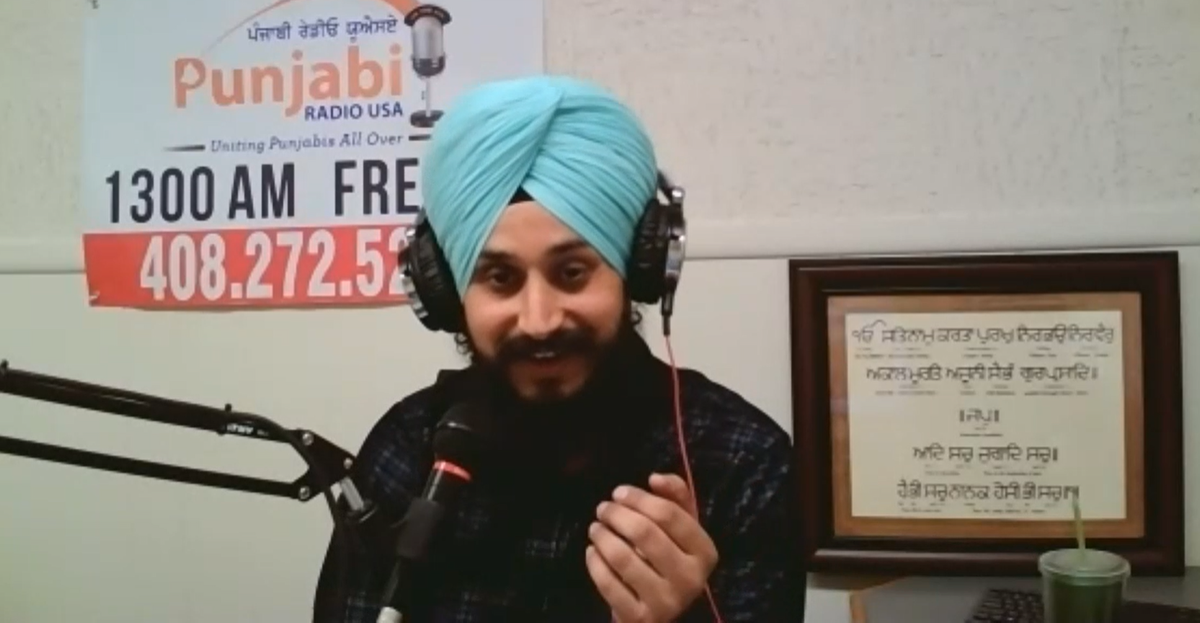
Most health agencies with any information in Punjabi offer just selected documents, or an option to translate automatically using Google Translate—a far cry from the multi-page websites, regular press releases and dynamic data dashboards available in English and sometimes in Spanish. Singh says it’s frustrating to see his community left in the dark. “I know people can argue they need to know English. Ok, they need to know English,” he says. “But how are they reaching out? There is no outreach to them. Even the health officials, the departments, they are not contacting us.”
Until recently, that is. In the last month, Singh says the state Department of Health has gotten in touch with the station to run a vaccine information campaign. On March 22, the state made the online vaccine appointment scheduling tool MyTurn available in five new languages, including Punjabi, and on March 27, the Fresno County Department of Public Health hosted a vaccine clinic at a Selma Gurdwara in conjunction with the Jakara Movement.
By mid-April, all Californians over age 16 will be eligible for the COVID vaccine, regardless of occupation. That includes truckers, of course, though Sunny Grewal believes they should have been prioritized in an earlier tier alongside first responders. “They should start thinking about truckers seriously, how much we help,” he says. “I know it’s our job but we still are humans too.”
His suggestion: Offer the shots at rest stops where so many truckers pass by every day. It’s an idea also argued recently in a letter from the Owner-Operator Independent Drivers Association to the Centers for Disease Control and Prevention.
Invest in quality science journalism by making a donation to Science Friday.
Kerry Klein is a reporter at Valley Public Radio in Fresno, California.
IRA FLATOW: This is Science Friday. I’m Ira Flatow. A little bit later, we’ll talk about long-haul COVID and what treatment options are out there. But now, it’s time to check in on the state of science.
KATE: This is Kate [INAUDIBLE].
SPEAKER 1: For WW&O.
SPEAKER 2: St. Louis Public Radio.
SPEAKER 3: Iowa Public Radio News.
IRA FLATOW: Local science stories of national significance. During the pandemic, there’s been a lot of talk about the safety of essential workers, people who keep the infrastructure and basic operations of the country going for the rest of us. One group designated as essential workers was truck drivers. In California, Punjabi Sikhs, or some people pronounce it, “Seeks,” from that northern Indian region make up a large part of the trucking workforce. According to the North American Punjabi Trucking Association, Punjabi Sikhs make up 40% of the trucking workforce in California and 20% nationally. But navigating COVID information and resources for Sikh truckers has been a challenge. Kerry Klein is here to fill us in on this story. She’s a reporter at Valley Public Radio in Fresno, California. Welcome back.
KERRY KLEIN: Thanks, Ira.
IRA FLATOW: Let’s talk about this. In California, truckers were deemed essential workers. Did this translate into more resources or vaccine priority?
KERRY KLEIN: No, it has not. At least not yet. Early on, when the vaccine itself first came out in California, there was the statewide list of vaccine priority. They had these tiers by occupations, like health care workers, teachers. Transportation workers were originally just a few tiers down in that list, but in January, Governor Newsom shifted this all to be a priority system based on age and medical vulnerability, leaving truckers to wait their turn, along with all the rest of us. So that’s for the vaccine. But then also, health agencies at the state and with various counties have provided very little information about COVID-19 in these truckers’ native language of Punjabi, leaving them also feeling a little bit left behind in all of this.
IRA FLATOW: Yeah. I know in your story, as you covered this issue, you spoke to Punjabi Sikh truck drivers. How were they feeling about the resources that were available to them? What were the main issues? Was it that no one was communicating with them?
KERRY KLEIN: Yeah, I mean that was one of the biggest issues. And I shouldn’t say that no one. A lot of health agencies, they might make a couple of documents or a couple of fact sheets available in Punjabi. But the rest of us who speak English and sometimes Spanish, we have these data dashboards. We have these registration pages for testing and for vaccines. And a lot of these things are not made available in Punjabi. And so it can be very difficult to navigate, get access to resources, and get these ever changing resources and regulations and policies directly from the health agencies. And that was leaving a lot of other organizations to step in and fill in these information gaps.
IRA FLATOW: You spoke with Rajkaranbir Singh who is an announcer, an engineer with Punjabi Radio USA. And this is what he had to say.
RAJKARANBIR SINGH: I know people can argue, OK, they need to know English. OK, they need to know English. But how are they reaching out? There is no outreach to them. Even the health officials or the departments, they are not contacting us.
IRA FLATOW: Kerry, is that what you found?
KERRY KLEIN: Yeah. What Singh is saying there is that his radio station, Punjabi Radio USA, they have an incredible reach. They have these brick and mortar radio stations that broadcast locally, but they also have these internet streams that reach people and truckers, especially, around the country. And he’s saying, we have this incredible network reaching these essential workers, and yet health agencies are not contacting us to actually do outreach to them. And he was really frustrated by his community being left in the dark.
But that being said, recently, in the last month or so, a lot of that has been changing. So the state did contact his station to set up a vaccine campaign in Punjabi, and then some counties also have been– Fresno County, particularly, has been scheduling vaccine clinics at Sikh temples. And other organizations are beginning to get contacted by health agencies to do these Punjabi campaigns around the state.
IRA FLATOW: This lack of information has been an issue for the wider Punjabi-speaking community. There were Punjabi organizations, right, that stepped in to fill in the information gaps. What were some of those campaigns like?
KERRY KLEIN: Yeah, well, so one of them is this Punjabi Radio USA that we already talked about. During the pandemic, they really doubled their news content and did a lot of call-in shows that have been specifically about COVID. And a lot of truck drivers, especially, have told me that this is where they got their daily news, is from this radio station.
But there’s also another organization known as the Jakara Movement. It’s a non-profit here in California. They’ve translated a lot of information. They’ve gone out to Sikh temples to help register people for tests and vaccines and they’ve also put out culturally-sensitive graphics for things like how to wear a mask over a turban and showing elderly people in traditional clothing getting the vaccines to promote people who look like them in this community being reached by a pandemic information.
IRA FLATOW: The San Joaquin Valley is Southeast of San Francisco. How has the pandemic affected that area?
KERRY KLEIN: Well, we have been, by a lot of measures of the pandemic, we have been hit harder than the rest of the state. We were, along with the Los Angeles area, we were the first region to go into regional lockdowns last fall. Our hospital ICUs were at capacity for a month during the winter surge. We’ve lagged behind the rest of the state in improving and reopening. That being said, however, California is actually, right now, doing very well compared to the rest of the country, and that includes our region as well.
IRA FLATOW: Thank you, Kerry. Great information. Thanks for taking time to be with us today.
KERRY KLEIN: You’re welcome.
IRA FLATOW: Kerry Klein, a reporter for Valley Public Radio in Fresno, California. You can read her full report. It’s up on our website, sciencefriday.com/stateofscience.
Copyright © 2021 Science Friday Initiative. All rights reserved. Science Friday transcripts are produced on a tight deadline by 3Play Media. Fidelity to the original aired/published audio or video file might vary, and text might be updated or amended in the future. For the authoritative record of Science Friday’s programming, please visit the original aired/published recording. For terms of use and more information, visit our policies pages at http://www.sciencefriday.com/about/policies/
Alexa Lim was a senior producer for Science Friday. Her favorite stories involve space, sound, and strange animal discoveries.
Lauren J. Young was Science Friday’s digital producer. When she’s not shelving books as a library assistant, she’s adding to her impressive Pez dispenser collection.
Ira Flatow is the founder and host of Science Friday. His green thumb has revived many an office plant at death’s door.